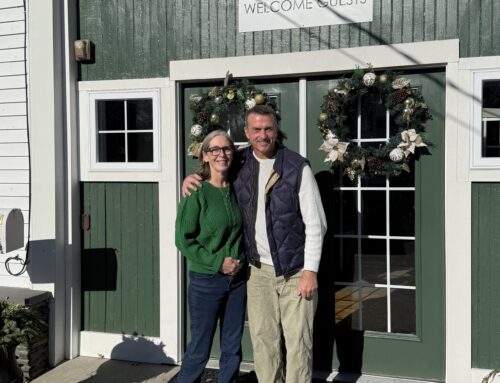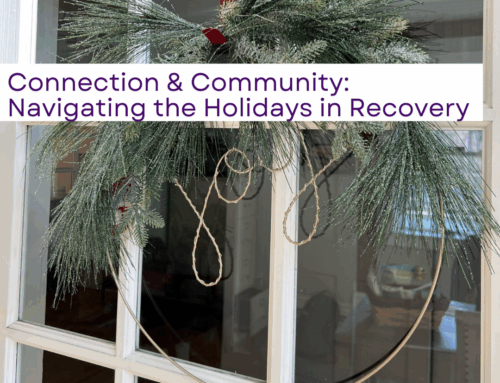Yoga has been said to be the journey through the self, to the self. At Herren Wellness our resident yoga teacher Rachel Tondreault leads our guests in yoga practice each morning in the light filled studio at Jacob Hill.
Being in recovery herself, Rachel is able to connect with guests in a unique way and bridge yoga practice into the guests’ recovery journey.
In this weeks blog we sit down with Rachel to hear how yoga has impacted her life and recovery, and also dive into the emerging Yoga for 12 Step Recovery model.
What led you to become a yoga instructor? How has yoga impacted your life?
I had been practicing on and off for about a year when the studio owner of the space I’d been frequenting asked me if I had ever considered becoming a teacher (I was in active addiction, had zero direction and had never even once considered becoming a Yoga teacher). Once she planted the seed, I thought about it nearly every day for a year. Then when the offer to attend training came back around, I took it. During training I learned far more than how to teach yoga. I learned how to embody yoga on and off my mat. I got in touch with my values for the first time. I questioned the way I had been living. 3 months after completing my 200 hour yoga teacher training, in March 2017, I got sober.
How do you see yoga impacting people’s recovery? What are the largest benefits of yoga?
Yoga has so many benefits. Physically, yoga is fantastic for your nervous system, for bone health, and cardiovascular health, it lowers your risk of heart disease, lowers blood pressure and improves your lung capacity. The physical benefits are wide reaching- and so are the spiritual benefits. I see yoga impacting people’s recovery in 4 important ways. Body awareness, boundaries, feeling discomfort, and feeling a sense of mastery.
The first is in becoming physically present in our bodies. As a recovering alcoholic, I know firsthand how challenging it is to remain present in our bodies. After years of compulsively escaping my body by getting high or drunk, getting present and grounded is hard work. Sitting in stillness is hard work. Once we’re physically present, once we’re in the body and paying attention to what the body is saying, we can start to set boundaries.
Boundaries are so important for a person in recovery because we spent years ignoring them. We blow past others boundaries, we let others blow past our boundaries, and repeatedly we dishonor our own by putting ourselves in painful and dangerous positions. Through presence and body awareness, we learn to honor what the body can and can’t do. We learn to honor what we do and don’t need, what we do and don’t want. We learn to hear the teacher tell us what the pose is, and how to discern whether we will say “yes” or “no”. We learn freedom and power. We also learn how to experience discomfort without running from it.
Being in warrior 2 for 10 slow, steady breaths can feel like a lifetime. Your quad is burning, your ass is burning, your heart is pounding in your ears- and you take another breath. You don’t run from it, you don’t try to fix it, you hold space for the discomfort and you let yourself feel it. In this way we become less afraid of feeling what doesn’t feel “good”. Also, because yoga is a practice that continues over time, you experience change and growth. You have good days on your mat and bad days on your mat. You hone your skills, you build strength and confidence. And each time you make it to your mat and you don’t run from what you experience there, you gain mental optimism and a sense of mastery over something challenging. Now you are starting to believe you can do difficult things and survive.
Is there a student of yours who sticks out in your mind where yoga changed their life/perspective?
The first year Herren Wellness was in operation, I met a woman who I continue to see weekly until this day. I won’t dive into her story because I want to honor her privacy, but I will say that the experience of yoga has changed her entire perspective and lifestyle. Through yoga, she has gained a deep sense of inner peace and the importance of protecting that peace. I observe her embodying the serenity prayer, releasing what she cannot control and finding power in what she can. I have seen this repeatedly happen with so many different people. People find yoga for any number of reasons (though recovery, because they want to get flexible or lose weight, because someone dragged them or their doctor told them to go) and who stay because they feel yoga has given them an honest way back to themselves.
An emerging holistic model for recovery that is gaining momentum is Yoga for 12 Step Recovery, or Y12SR. Y12SR is a holistic model which addresses the physical, mental and spiritual “dis-ease” of addiction. Informed by the latest research in neuroscience and trauma healing, Y12SR combines the somatic approach of yoga with the cognitive approach of the 12-step recovery model – the most well-known addiction recovery program in the world, with millions of active practitioners.
Founder of Y12SR Nikki Myers is a recovering addict and found herself in a 12 step program in 1987 and experienced great success in her sober life going back to school and building her family. However, eight years later she experienced a relapse that left her wanting more for her recovery. She began her journey with yoga, abandoning the 12 step program and four years later experienced another relapse.
“In one case, I got all these great grades and I was into the mental stuff and thought that was it. In the other case, I got into my body and although I did find all these philosophical connections, there was no real integration between those things.” (source).
Nikki realized that for her recovery she would need to integrate 12 step and yoga, and combining her education she created Y12SR. Since founding Y12SR in 2004, Nikki has helped thousands of individuals alongside the 1800+ Y12SR leaders who have joined in on her worldwide mission. And thanks to Y12SR’s holistic approach to healing addiction that includes naming social inequity as it relates to race, she empowers us to heal our communities. Meetings can be found on the Y12SR website here.
At Herren Wellness we believe in the benefits of holistic wellness and healthy activity to achieve sustained recovery, including practices such as yoga, acupuncture, massage therapy, physical fitness, hyperbaric oxygen therapy and nutrition. We are so grateful to have Rachel as part of our Herren Wellness team to offer guests the experience of incorporating yoga into their recovery. When guests leave Rachel’s morning classes they are at ease and ready to embrace the day ahead of them.
Yoga reintroduces the separated parts of self, and that is our mission at Herren Wellness: to help guests on their journey to recovery and discovering their “why”.
About Herren Wellness
Herren Wellness is a thriving community of people at all stages of their recovery journey. We introduce healthy habits and routines centered around emotional, physical, and spiritual wellness that provide a solid foundation for rediscovering your interests, experiencing joy in sobriety, and building structure and routine.
We provide several alumni support communities, including a weekly recovery support group, monthly alumni meeting, and online alumni community you can access anytime. Your connection to Herren Wellness doesn’t end when your stay ends; we are there for you throughout your recovery journey.
If you, or a loved one, are looking for help, please call us at (844) 443-7736, email us at info@herrenwellness.com, or fill out a contact form. You are not alone.





